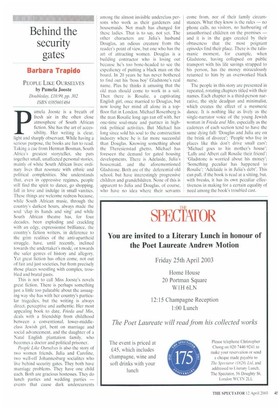Behind the security gates
Barbara Trapido
PEOPLE LIKE OURSELVES by Pamela Jooste Doubleday, £10.99, pp. 302 ISBN 0385601484
pamela Jooste is a breath of fresh air in the often close atmosphere of South African fiction. She has the art of accessibility. Her writing is clear, light and sharply observant. While having a serious purpose, the books are fun to read. Taking a cue from Herman Bosman, South Africa's greatest storyteller, she puts together small, unaffected personal stories, mainly of white South African lives; ordinary lives that resonate with ethnic and political complexities. She understands that, even in oppressive regimes, people still find the spirit to dance, go shopping, fall in love and indulge in small vanities. These things are welcome redress because, while South African music, through the country's darkest hours, always made the soul 'clap its hands and sing' and while South African theatre has, for four decades, been exploding and crackling with an edgy, expressionist brilliance, the country's fiction writers, in deference to the grim realities of the anti-apartheid struggle, have, until recently, inclined towards the undertaker's mode, or towards the safer genres of history and allegory. Yet great fiction has often come, not out of fair and just societies, but from precisely those places wrestling with complex, troubled and brutal pasts.
This is not to call Miss Jooste's novels great fiction. There is perhaps something just a little too palatable about the assuaging way she has with her country's particular tragedies, but the writing is always direct, perceptive and authentic. Her most appealing book to date, Frieda and Min, deals with a friendship from childhood between a conventional, lower-middleclass Jewish girl, bent on marriage and social advancement, and the daughter of a Natal English plantation family, who becomes a doctor and political prisoner, People Like Ourselves is also the story of two women friends, Julia and Caroline, two well-off Johannesburg socialites who live behind security gates. They both have marriage problems. They have one child each. Both are gracious hostesses. They do lunch parties and wedding parties — events that cause dark undercurrents among the almost invisible underclass persons who work as their gardeners and housemaids. Not much has changed for these ladies. That is to say, not yet. The other characters are Julia's husband Douglas, an odious creature from the reader's point of view, but one who has the art of attracting women. Douglas is a building contractor who is losing out because he's too bone-headed to see the expediency of putting a black man on the board. In 20 years he has never bothered to find out his 'boss boy' Gladstone's real name. Plus he thinks it amusing that the old man should come to work in a suit. Then there is Rosalie, a captivating English girl, once married to Douglas, but now losing her mind all alone in a topfloor tlat in London, Michael Rosenberg is the man Rosalie long ago ran off with, her one-time soul-mate and partner in highrisk political activities. But Michael has long since sold his soul to the construction industry where he is far more successful than Douglas. Knowing something about the Theresienstad ghetto, Michael has foreseen the demand for gated housing developments. There is Adelaide, Julia's housemaid, and the aforementioned Gladstone. Both are of the deferential old school, but have interestingly progressive children and grandchildren. None of this is apparent to Julia and Douglas, of course, who have no idea where their servants come from, nor of their family circumstances. What they know is the rules — no phone calls, no visitors, no harbouring of unauthorised children on the premises — and it is in the gaps created by their obtuseness that the most poignant episodes find their place. There is the talismanic moment, for example, when Gladstone, having collapsed on public transport with his life savings strapped to his person, has the money miraculously returned to him by an overworked black nurse.
The people in this story are presented in repeated, rotating chapters titled with their names. Each chapter is a third-person narrative, the style deadpan and minimalist, which creates the effect of a mesmeric dance. It is nothing like as lively as the single-narrator voice of the young Jewish woman in Frieda and Min, especially as the cadences of each section tend to have the same dying fall: 'Douglas and Julia are on the brink of divorce'; 'People who live in places like this don't drive small cars'; 'Michael goes to his mother's house'; 'Lally and Albert call Rosalie their friend'; 'Gladstone is worried about his money'; 'Something peculiar has happened to Rosalie'; 'Adelaide is in Julia's debt'. This can pall, if the book is read at a sitting, but, with breaks, it has its own peculiar effectiveness in making for a certain equality of need among the book's troubled cast.


































































 Previous page
Previous page